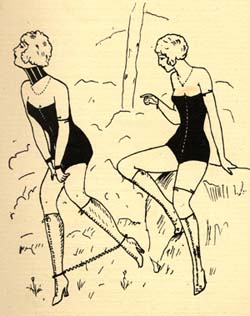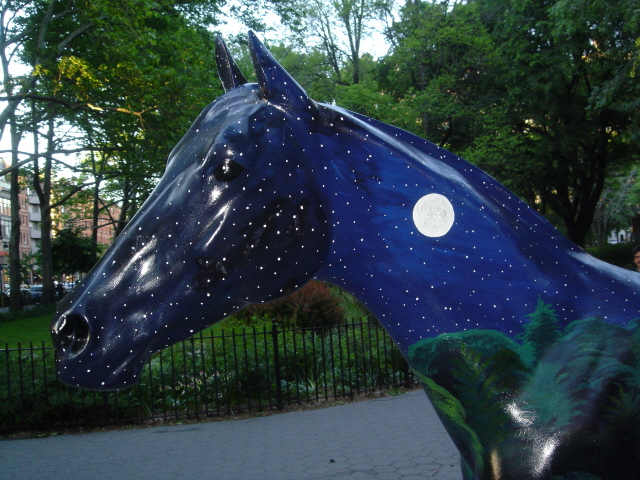
I. Daphne
Red hair, green headband, purple sweater and mini-skirt, lavender stockings. Except these details have been drained of their signifying colors, the perpetual chromatic pattern that denotes her character in countless cels, countless hours of Saturday morning cartoon dreck. Drained, because she’s a drawing in a coloring book now, ready to be filled in with Crayolas, with whatever colors his six-year-old hand deems appropriate. But he never gets around to that, because other details, new details, have overwhelmed his eyes. For in this drawing (as in nearly every episode of Scooby-Doo), Daphne is bound and gagged: ropes empty of color encircle her ankles and pin her hands unseen behind her, while a blank expanse of white obliterates the lower half of her face, beneath those doe eyes. She doesn’t look scared or helpless, exactly: she is the designated Damsel in Distress (poor scholarly Velma never gets to have any kinky fun). Her eyes, drawn by an anonymous hand and reproduced by the thousands, seem to say this is what I was made for. Or is that his inarticulate gaze, projecting something he does not and will not ever understand, something at the core of his being: this is what I was made for. His cock hardens, long before the concepts of puberty or sex are even a full glimmering, like a mystery: a mystery once wet and impressionable, suddenly baked in some kiln deep in his consciousness.
But what fires? Does it matter? There is Daphne, rooted. She escapes without escaping, transformed into a thorny laurel, happily worn.
II. The Club
After a time, you decide that there must be something you can do to dull your loneliness and isolation (1), something between the impossibility of dating and the expensive, disembodied pleasures of Jane Nightwork (2). You put aside your disdain and scruples and start looking for... not a community, no, not that. A society. You're in New York now, after all, and those sorts of societies exist. You try the oldest one, called TES. TES stands for The Eulenspiegel Society, but no one refers to it by that mouthful—everyone pronounces it as if referring to the Hardy novel or a girl in some lost steno pool of the past. You go to meet TES, once, twice. They have meetings every week in a rented space on 36th, and the meetings go well. You've long avoided any sort of BDSM (3) scene for the same reasons you stopped going to science fiction conventions: you just don't want to be associated with these dorks (that you were once a tremendous dork yourself doesn't enter into it). Additionally, your aesthetic is often completely out of step with those who share your proclivities (4).
But the meetings go well. There is enough diversity and openness among the members that you are put at ease. The dorks are there, but they are few. The presentations are excellent, even if you already know all about the subjects. You're not there to meet anyone, but to make... friends? No, more like acquaintances, ones you can talk to about these sorts of things. You decide to attend their upcoming College Night, because even though you disdain clubs you're still curious to see the inside of Paddles, the only functioning BDSM club left in the city. Besides, your college ID translates into a $5 admission fee instead of $25; this is likely the only time you'll get your money's worth.
And Paddles, located in a basement on 26th, is what you expect, down to the inept, unsexy mural (5) and the row of soda cans on the bar that signifies the absence of alcohol. There are the usual alcoves for scenes, each with the whiff of the improvised dungeon—though one room is fitted out nicely in a sort of Spanish Cloister style, with heavy wooden bondage beds and racks. Later, an old hand tells you about the fabulous Egyptian-themed room that was walled off because it was actually over the club's property line, and you think how appropriate. Two video monitors show scenes from a compendious DVD set called Russian Slaves, filled with bad lighting, sadly hilarious subtitles ("You broked my rod, bitch!") and bizarre end titles, where the word END is superimposed over shaky shots of trees and leaves (shots that last for a good two minutes, as if a studied engagement with sunlight and nature will somehow wash away the depravity that's preceded it).
There are thirty-six of these discs, all lined up for sale next to the rows of paddles, crops, floggers and canes (6) that constitutes the club's retail offerings.
You've come too early, as you usually do. You wander here and there, conspicuous in fedora and dark suit (7). In the back of your mind, you're always certain that somehow, someway, the woman who appreciates this style will walk into a situation like this and zero in on you like a dive bomber (as much as a submissive can be said to "zero in"). The theme is Spring Break, and you're wearing the plastic lei the door person handed you, but soon you take it off. You're bored. You walk around, but you don't want to be a guppy: one of those anonymous, silent, single men who wander sex clubs, BDSM or otherwise, like zombies. There's one of those here already, a young man, the spitting image of Bud Cort, wearing a dark trench coat and with a look on his face that radiates creep for a good five feet around him. Everyone, male and female, studiously avoids his gaze.
Fortunately a fellow Dom recognizes you from one of the meetings, and you wind up talking to him for a long time about movies and marriage and what TES and “the scene” (8) was like "in the old days." He's a former board member and happy to oblige your curiosity. His name is Victor, and he resembles a kinder, gentler Penn Gillette. You say hello to some others you recognize from meetings, and everyone is friendly but a little standoffish, except for Princess Paula, a big girl who dresses in Goth schoolgirl style and whose cute demeanor barely conceals her sadism. You have a long conversation with her, wherein you find out that she writes the descriptions for the cheeses at Morty’s Cheese Shoppe (she once made cheese on a farm in Vermont) and prefers punching to open-handed spanking (later you watch her punch a sub boy's shoulder a hundred times with the glee of a Lucy Van Pelt whacked out on angel dust). Paula is all bitchy fun, and you enjoy her sarcastic barbs, especially those lobbed at the two vanillas (9) half-heartedly go-go dancing in the cage suspended nearby.
Ah, yes, the vanillas. It is College Night, and several undergrads are here, clustering together in little groups for protection. Most of them are from Conversio Virium, the student BDSM group at Columbia; the group that makes you wish you were at Columbia rather than City. Many are young and hot and don't give you the time of day, except for Lena (or Mena, the music is louder now and you don't quite catch it), who is less cute, more of a hippie, a slight slips of a girl who has a girlfriend she's trying to break in and goes to (where else) Barnard. You have a long, interesting conversation with her about Freud (10)—she's just declared her major—and Jung, and if she wasn't in a strictly monogamous situation that conversation could go somewhere... but it doesn't, and part of you is strangely relieved.
You're free, you see. Free to be a part but not subsumed, free to observe and make connections but not fall into a trance, nor into an entanglement, ha ha.
By this time there are several scenes going on. A tiny Asian girl is flogging a skinny boy. A tall man binds one of the Columbia girls and is moving an electric wand over her ass. In the Cloister, a big sub has been bound, spread-eagled, to the bed by means of a web of ropes so elaborate they look like a Rube Goldberg device. Another group—an Amazonian brunette, a black mistress in stiletto boots, a tiny Italian woman who stands at her side like her assistant, and two men who would not be out of place in a Ron Jeremy look-a-like contest—wanders from this room to that, trying to find the right place. "These manacles are too low!" barks the mistress, and off they troop to another part of the club, pushing their way through the throng. Meanwhile, upstairs, an elfin switch couple you recognize from the meetings have spent the whole evening in a very measured, sweet, and loving spanking and clamping scenario. Their tiny eyes are glowing with pleasure, and half a dozen people are sitting around them, rapt at the control and tenderness (11).
And none of this leaves much of an impression on you, not arousal, not repulsion. Nothing encourages the melancholy of painful memories, or the flights of future fancies. There are intimacies here and there, even those played out in public, but they are not your intimacies... and the public displays are for some other public, one in which you are and are not a member.
And then it's after midnight. You have to go—there are pancakes on Strivers' Row, sunlight on hardwood and jazz in the air, in your future. You say a few good-byes, to Lena/Mena, who "hopes to see you again some Friday," to Princess Paula, who tells you to ask for her next time you're at Morty's, "but just ask for 'Paula' because they don't know me as Princess there yet," to Victor, who would be happy to show you how to crack a whip "just like Indiana Jones" sometime in the future. You head for the stairs, and the woman working the door says "Safe journey," which is odd, because that's what you say in parting to friends at subway entrances. Safe journey, like a safe word (12). You feel as if you found precisely what you expected, but this leaves you calm rather than agitated, hopeful rather than disappointed.
You cross the street feeling that you have, on some level, at least put in an appearance. Which is something: often, the only thing you need to do. A phrase occurs to you: You'll never be a member but you'll always be an honored guest. At the moment, honored guest seems like something worth aspiring to.
(1) Loneliness
Pete Hamill wrote in Why Sinatra Matters that loneliness was Sinatra’s only subject. Either he was pining for the girl who went/got away, or he was singing about his relief when the girl was/would be in his life. To describe it thus—that joy and companionship are not entities in themselves, but merely an absence of loneliness—seems akin to saying that light is merely the absence of dark: an inversion that seems truer than not. Half-empty or half-full? How much of our lives, our desires, are dictated by this temperament, this mere point of view? And yet isn’t all we have—all we can know and understand on the deepest levels, no matter how much empathy or identification we have with others—is merely a point of view? A place from which we gaze, helplessly?
(2) Phone Sex
The safest sex you can have, and thus the most addictive. What good is a fantasy life, an erotic imagination, if it cannot be articulated in language? The Voice searches out an ear to hear it, and searches for reciprocity: two minds, rather than hearts or genitals, in sync, operating as one, collaborating. This is why “talking dirty” is more transgressive than the acts themselves: to utter is to claim, to take a measure of responsibility for one’s desires. Thus the avoidance, until no longer possible, of saying I love you. Thus the seductive vortex of a shared onanism, where what is uttered is the only thing you have to claim. If you could afford it, you would never leave the house.
(3) BDSM
An acronym like an overstuffed suitcase, unpacked gingerly. Bondage Domination SadoMasochism, but the DS bespeaks D/s, Domination/Submission. You take the letters that seem pertinent and let the rest recede into their associations. Those on the outside, out of sympathy with or in ignorance of, see leather and whips and chains, the signifier as stereotype. Inside, you appropriate what you need, what speaks to your Eros: Bondage, yes; D/s, yes; SM, not so much. You are not interested in pain. Discomfort, yes; control, definitely; punishment, indeed. But there are myriad ways, thousands of variations on the themes. Inside, you see this, even as you realize that inside, too, the stereotypes multiply and reinforce themselves. Everywhere, there are those who tell you what D/s really “means,” what “true power exchange” is all about. Like any culture, there are critics and control-freaks, priests and purists, dogmatists and dilettantes. To navigate kink is like navigating anything else—to find your place, your course, you must steer between sirens and sea monsters. Only the insistence of your desires makes you anxious, like a painter who walks past hundreds of pictures without seeing one that speaks, or a musician who hears the same dull tune in a thousand songs. From those baggy monsters, those capital letters with their variegated, multitudinous shadings of meaning, you extract a vision of Eros that is your own, that defines itself against not only “normal” sex, but against the received deviancy of your own context: a set of customs and symbols often at odds with your own. Good luck!
(4) Anachronism
Far too many of those in “the lifestyle” (impoverished phrase, when what you want to say is life itself) are attracted to the tropes of Medievalism: the dungeon, the whiff of Inquisition tortures, the feudal style of master and servant, lords and ladies and their attendants. The intersection of BDSM and the Society for Creative Anachronism; with those who take their Dungeons & Dragons school days out into rented fields where they dress as knights and whack each other with padded staves; this makes you cringe. You can’t sit in judgment, but you can’t condescend to descend into this world: your anachronism lies elsewhere.
(5) Pornography
James Joyce, in Portrait of the Artist as a Young Man, describes the distinction between art and pornography as one in which the latter encourages your desire to possess the object you gaze upon. But the true distinction, whether on film or in print or in a comic book or on a wall, is that pornography is art that sets the bar for excellence so low that any one at all can step over it.
(6) Spanking
The exception to the disdain for pain. You remember as a young man reading how Kenneth Tynan was addicted to it, and a model for your own potential career as a distinguished critic with deviant proclivities pleasantly opened up before you. And how appropriate, for to you all this is, first and foremost, play: it is theatre before it is anything else. You are, in the end, a frustrated director, a Hitchcock in search of his icy blonde.
It is also about red, and shades of red, beautiful, entrancing shades of red. And the sadness that attends the end of any satisfying performance. Thus:
Isn’t She Pretty in—
She claims, It’s not my color, pink.
How love dyes such little deaths.
Tastes change when you’re on the brink,
I reply (not quite beneath my breath).
Eyes roll & bat, bratty, in a snit,
as if to beg for one more slap
to match the one whereupon she sits;
cheeks crisscrossed, a crimson map.
So cute when she resists, & all her
manners drop: below beribboned wrists,
she’ll soon reap a stinging crop.
Playtime, this life’s bittersweet demur:
games that have their ends. What persists:
pink, then red (& lonely at the top).
(7) 1939
Cuban-heeled seamed stockings, ankle-strap pumps, a smart black suit, slit-skirt just above the knee with pink trim, red hair in a bob, cat-eyed glasses on a silver chain, a dark red choker: executive secretary, high above the streets in the soft glow of an Art Deco wall-sconce, ready, always and ever ready, to execute all directives, all commands.
(8) The Scene
But if theatre, who is the audience? The exhibitionists, the voyeurs, make the club, that dark agora of desires, into their stage, and through the intensity (if not magic) of their performance banish, perhaps, the poverty of the club’s aesthetic identity. But like all artists, you cannot be content with the spectacle of others, and must enact the rituals, the ceremonies, the narratives, the fantasies, yourself. John Lennon: “I stopped being a fan the minute I picked up a guitar.” In your theater, audience participation is the norm: you and your submissive, your lover, your collaborator, are actor and audience, spectator and spectacle. The deep red velvet curtains of your mind, voluptuous and swaying slightly in breezes from hidden sources, veil a production that no act, no image, no storyline can match: rather, all of those acts and images and storylines are the raw materials for the unceasing dramaturgy of your erotics.
Do you understand now, the importance of your collaborators? The difficulty? The constant braiding and unbraiding (like ropes around limbs, around waists) of illusion and disillusion?
(9) Vanilla
Of course, there’s nothing at all wrong with vanilla. Sometimes, you can find really, really good vanilla, stellar vanilla, even spectacular vanilla. It’s just not chocolate. To paraphrase Nietzsche, “Without chocolate, life would be a mistake.”
(10) Somewhat Too Close to Home
Adam Philips, Houdini’s Box, pgs. 159-160: “People with what psychoanalysts—and other committed moralists—call perversions seem to know exactly what they desire. However shameful or otherwise troubling, their excitement, their engagement, is apparently guaranteed by certain acts or scenarios... These people know exactly what works for them. They always know beforehand what the object of desire is; they know the aim, even if they don’t (yet) know the way. They have what might be called a sense of direction, or even a vocation of sorts. They are narrow but sometimes bright with purpose... and they are people on the run from a fundamental and unnerving uncertainty about their desires. They can’t risk too much questioning of what they want because it would question who they are. They are fundamentalists of what they take to be their own nature.”
Or artists.
(11) Love & Consent
As Jenny Lewis sang in a song, “You are what you love, and not what loves you back.” Love, even in its striving toward a beloved, is a singular, solitary emotion. You may love whoever and however you wish, requited or unrequited: love cares little for outcomes. Octavio Paz, The Double Flame, pg. 160: “Beyond happiness or unhappiness, though it is both things, love is intensity: it does not give us eternity but life, that second in which the doors of time and space open just a crack: here is there and now is always. In love, everything is two and everything strives to be one.” Eros indeed is one of only two things that can stop time, that can steal away a little of death’s relentless dominion. But it can easily do this in the striving alone. In the erotics of that theatre, on that stage of power exchange, in that casting of roles and performance of parts, there must be something beyond love: there must be consent. Without consent, the show cannot—must not—go on. In this way, consent is the condition for not just for play, but for you, in your search for the gift of discipline, of structure, to those who desire it, it is the condition for love as well. By establishing the pattern, in collaboration with another, through negotiation and communion, the sublime artifice of love—you might even say supreme fiction—is achieved. The only other way to stop time is through art. To combine both is to—is to—
But here it slips away, and you are left alone with Love, mere Love.
(12) Safe Words
There are no safe words. Speak low, when you speak, love.
 Friday, February 13, 2009 at 03:32PM
Friday, February 13, 2009 at 03:32PM 



